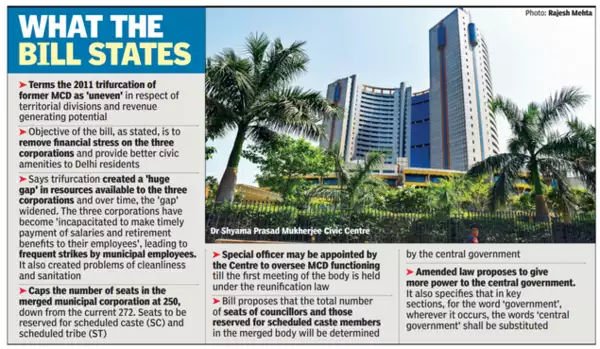Description

Copyright infringement not intended
Context - The Union Government has appointed Ashwani Kumar and Gyanesh Bharti as the Special Officer and Commissioner, respectively, of the unified Municipal Corporation of Delhi (MCD).
Details
- The Parliament has passed the Delhi Municipal Corporation (Amendment) Act, 2022 to unify the three Municipal Corporations of Delhi.
- The Act seeks to amend the Delhi Municipal Corporation Act, 1957 passed by Parliament. The Act was earlier amended in 2011 by Delhi Legislative Assembly to trifurcate the erstwhile Municipal Corporation of Delhi into:
- North Delhi Municipal Corporation
- South Delhi Municipal Corporation
- East Delhi Municipal Corporation
- The Act seeks to unify the three corporations.
Key Features of the Act
- Unification of Municipal Corporations in Delhi:
- The present Act replaces the three municipal corporations under the Act with One Corporation named the Municipal Corporation of Delhi.
- Powers of the Delhi government: The Act as amended in 2011 empowers the Delhi government to decide various matters under the Act. These include:
- The total number of seats of councillors and the number of seats reserved for members of the Scheduled Castes.
- Division of the area of corporations into zones and wards.
- Delimitation of wards.
- Matters such as salary and allowances
- The present Act instead empowers the central government to decide these matters.
- Number of councillors: The Act provides that the number of seats in the three corporations taken together should not be more than 272.
- The Act states that the total number of seats in the new Corporation should not be more than 250.
- Removal of Director of Local Bodies: The Act provides for a Director of Local Bodies to assist the Delhi government and discharge certain functions which include:
- Coordinating between Corporations.
- Framing Recruitment Rules for various posts.
- Coordinating the collecting and sharing of toll tax collected by the respective Corporations.
- The Bill omits the provision for a Director of Local Bodies.
- Special officer to be appointed by the central government:
- The Act provides that the central government may appoint a Special Officer to exercise powers of the Corporation until the first meeting of the Corporation is held after the commencement of the Act.
- E-governance system for citizens:
- The Act adds that obligatory functions of the new Corporation will include establishing an e-governance system for citizen services on an anytime-anywhere basis for a better, accountable, and transparent administration.
- Conditions of service for sweepers:
- The Act provides that a sweeper employed for doing house scavenging of a building would be required to give a reasonable cause or a 14-day notice before discontinuing his service.
- The present Act seeks to omit this provision.
Why unify?
- The main objective of trifurcation of creating compact municipalities in Delhi to provide more efficient civic services to the public has not been achieved.
- Instead, owing to inadequacies in resources and uncertainty in fund allocation and release, the three corporations have been facing huge financial hardships, making it difficult for them to maintain the civic services in Delhi at the desired levels.
- Trifurcation of the erstwhile Municipal Corporation of Delhi was uneven in terms of territorial divisions and revenue-generating potential.
- As a result, there was a huge gap in the resources available to the three corporations compared to their obligations.
- It says that the gap has grown, leading to delays in the payment of salaries and retirement benefits which have resulted in frequent strikes.
Concern
- The Act eliminates the role of the state government in the civic bodies
- The Act will mark a total exit of the state government from the MCD. While there is a very small role now, these amendments will take the Delhi government out of the picture entirely.
- The Centre's move to unify the three corporations into a single entity means it was not satisfied with the current situation of the three local bodies. And, reduction in the number of wards would mean, a delimitation exercise will be required, which can take several months or even over a year.
Way Forward
- According to Article 239AA of the Constitution of India, the Parliament has the power to amend or form laws on any matter formulated by the Delhi Assembly.
- At the time when the MCD was trifurcated, the expectation was that it would lead to Delhi’s progress. It was thought that the services provided by the MCDs will improve and there will be the welfare of its workers. But, the result was unsatisfactory in the last 10 years.
- The Act will ensure greater transparency, improved governance and more efficient delivery of civic service for the people of Delhi, and also ease the financial crisis faced by MCDs at present.
https://epaper.thehindu.com/Home/ShareArticle?OrgId=GBO9R9AAA.1&imageview=0















